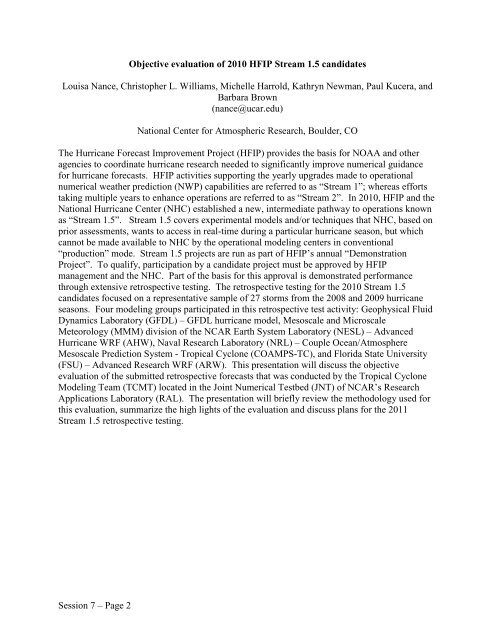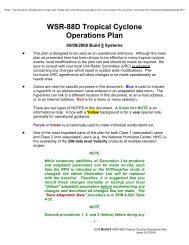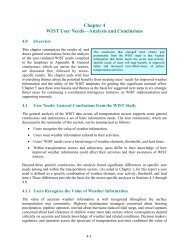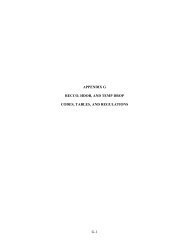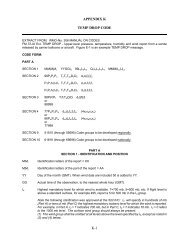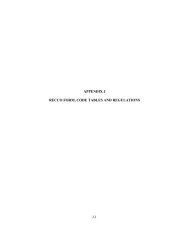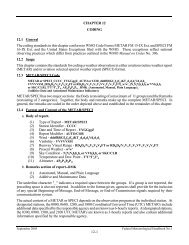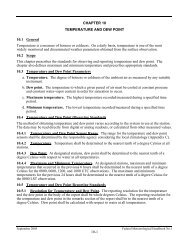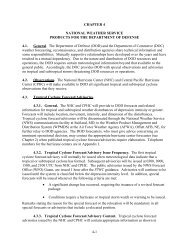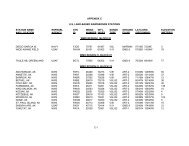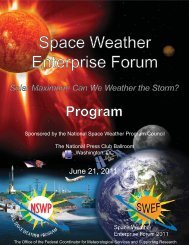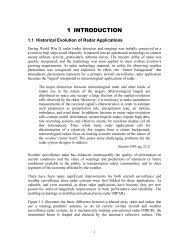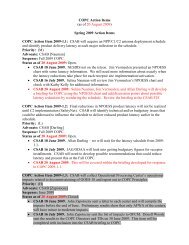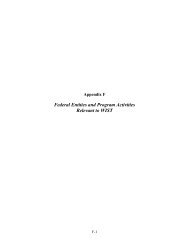65th IHC Booklet/Program (pdf - 4.9MB) - Office of the Federal ...
65th IHC Booklet/Program (pdf - 4.9MB) - Office of the Federal ...
65th IHC Booklet/Program (pdf - 4.9MB) - Office of the Federal ...
Create successful ePaper yourself
Turn your PDF publications into a flip-book with our unique Google optimized e-Paper software.
Objective evaluation <strong>of</strong> 2010 HFIP Stream 1.5 candidates<br />
Louisa Nance, Christopher L. Williams, Michelle Harrold, Kathryn Newman, Paul Kucera, and<br />
Barbara Brown<br />
(nance@ucar.edu)<br />
National Center for Atmospheric Research, Boulder, CO<br />
The Hurricane Forecast Improvement Project (HFIP) provides <strong>the</strong> basis for NOAA and o<strong>the</strong>r<br />
agencies to coordinate hurricane research needed to significantly improve numerical guidance<br />
for hurricane forecasts. HFIP activities supporting <strong>the</strong> yearly upgrades made to operational<br />
numerical wea<strong>the</strong>r prediction (NWP) capabilities are referred to as “Stream 1”; whereas efforts<br />
taking multiple years to enhance operations are referred to as “Stream 2”. In 2010, HFIP and <strong>the</strong><br />
National Hurricane Center (NHC) established a new, intermediate pathway to operations known<br />
as “Stream 1.5”. Stream 1.5 covers experimental models and/or techniques that NHC, based on<br />
prior assessments, wants to access in real-time during a particular hurricane season, but which<br />
cannot be made available to NHC by <strong>the</strong> operational modeling centers in conventional<br />
“production” mode. Stream 1.5 projects are run as part <strong>of</strong> HFIP’s annual “Demonstration<br />
Project”. To qualify, participation by a candidate project must be approved by HFIP<br />
management and <strong>the</strong> NHC. Part <strong>of</strong> <strong>the</strong> basis for this approval is demonstrated performance<br />
through extensive retrospective testing. The retrospective testing for <strong>the</strong> 2010 Stream 1.5<br />
candidates focused on a representative sample <strong>of</strong> 27 storms from <strong>the</strong> 2008 and 2009 hurricane<br />
seasons. Four modeling groups participated in this retrospective test activity: Geophysical Fluid<br />
Dynamics Laboratory (GFDL) – GFDL hurricane model, Mesoscale and Microscale<br />
Meteorology (MMM) division <strong>of</strong> <strong>the</strong> NCAR Earth System Laboratory (NESL) – Advanced<br />
Hurricane WRF (AHW), Naval Research Laboratory (NRL) – Couple Ocean/Atmosphere<br />
Mesoscale Prediction System - Tropical Cyclone (COAMPS-TC), and Florida State University<br />
(FSU) – Advanced Research WRF (ARW). This presentation will discuss <strong>the</strong> objective<br />
evaluation <strong>of</strong> <strong>the</strong> submitted retrospective forecasts that was conducted by <strong>the</strong> Tropical Cyclone<br />
Modeling Team (TCMT) located in <strong>the</strong> Joint Numerical Testbed (JNT) <strong>of</strong> NCAR’s Research<br />
Applications Laboratory (RAL). The presentation will briefly review <strong>the</strong> methodology used for<br />
this evaluation, summarize <strong>the</strong> high lights <strong>of</strong> <strong>the</strong> evaluation and discuss plans for <strong>the</strong> 2011<br />
Stream 1.5 retrospective testing.<br />
Session 7 – Page 2


